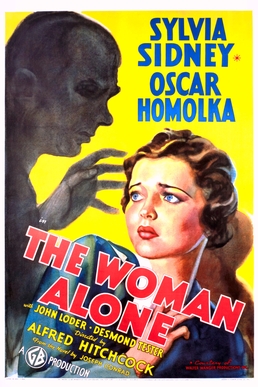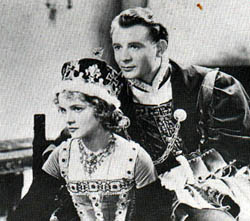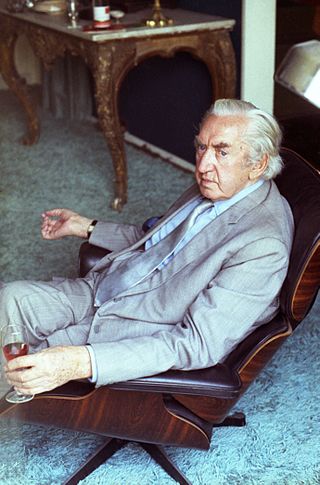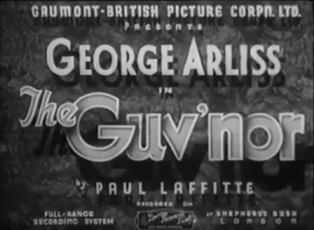
Sabotage, released in the United States as The Woman Alone, is a 1936 British espionage thriller film directed by Alfred Hitchcock starring Sylvia Sidney, Oskar Homolka, and John Loder. It is loosely based on Joseph Conrad's 1907 novel The Secret Agent, about a woman who discovers that her husband, the owner of a London movie theatre, is a terrorist agent.

Secret Agent is a 1936 British espionage thriller film directed by Alfred Hitchcock, adapted from the play by Campbell Dixon, which in turn is loosely based on two stories in the 1927 collection Ashenden: Or the British Agent by W. Somerset Maugham. The film stars Madeleine Carroll, Peter Lorre, John Gielgud, and Robert Young. It also features uncredited appearances by Michael Redgrave, future star of Hitchcock's The Lady Vanishes (1938), Michel Saint-Denis as the Coachman, and Michael Rennie in his film debut.

Ashenden: Or the British Agent is a 1927 collection of loosely linked stories by W. Somerset Maugham. It is partly based on the author's experience as a member of British Intelligence in Europe during the First World War.

Tudor Rose is a 1936 British film directed by Robert Stevenson and starring Cedric Hardwicke and Nova Pilbeam.

Slave Ship is a 1937 American historical adventure film directed by Tay Garnett and starring Warner Baxter, Wallace Beery and Elizabeth Allan. The supporting cast features Mickey Rooney, George Sanders, Jane Darwell, and Joseph Schildkraut. It is one of very few films out of the forty-eight that Beery made during the sound era for which he did not receive top billing.

The Moon's Our Home is a 1936 American comedy film directed by William A. Seiter and starring Henry Fonda, Margaret Sullavan and Walter Brennan. It was adapted from a novel of the same name written by Faith Baldwin and first published in serial form in Cosmopolitan magazine.

Brian Desmond Hurst was an Irish film director. With over thirty films in his filmography, Hurst was hailed as Northern Ireland's best film director by BBC film critic Mike Catto. He is perhaps best known for the 1951 A Christmas Carol adaptation Scrooge.

Action for Slander is a 1937 British drama film directed by Tim Whelan and starring Clive Brook, Ann Todd and Googie Withers. The plot is about an army officer who is falsely accused at cheating at cards by a man whose wife he had an affair with and struggles to clear his name. It was an adaptation of the 1937 novel Action for Slander by Mary Borden.

The Guv'nor is a 1935 British comedy film starring George Arliss, Gene Gerrard and Viola Keats, and directed by Milton Rosmer. Arliss in the title role is a tramp who rides a series of misunderstandings and becomes the president of a bank. It was a remake of the 1934 French film Rothchild. The film was re-released in England in 1944 and 1949. It was released in the US as Mr. Hobo.

Ourselves Alone is a 1936 British drama film depicting a love story set against the backdrop of the Irish War of Independence. The title is a translation of the Irish slogan Sinn Féin Amháin. It is directed by Brian Desmond Hurst and stars John Lodge, John Loder and Antoinette Cellier.

Jack of All Trades is a 1936 British comedy film directed by Robert Stevenson and Jack Hulbert and starring Hulbert, Gina Malo and Robertson Hare. It is based on the 1934 play Youth at the Helm. The film was made at Islington Studios, with sets designed by Alex Vetchinsky.

Sensation is a 1936 British crime film directed by Brian Desmond Hurst and starring John Lodge, Diana Churchill, Francis Lister and Felix Aylmer. The screenplay concerns a crime reporter who solves a murder case using a piece of evidence he found amongst the victim's possessions.
The Tenth Man may refer to:

Everything Is Thunder is a 1936 British thriller film directed by Milton Rosmer and starring Constance Bennett, Douglass Montgomery and Oskar Homolka. Its plot concerns a British officer who attempts to escape from a German Prisoner of War camp during the First World War.
The Great Barrier is a 1937 British historical drama film directed by Milton Rosmer and Geoffrey Barkas and starring Richard Arlen, Lilli Palmer and Antoinette Cellier. The film depicts the construction of the Canadian Pacific Railway. It was based on the 1935 novel The Great Divide by Alan Sullivan. It was made at the Lime Grove Studios in Shepherd's Bush. The film's sets were designed by Walter Murton.

Glamorous Night is a 1937 British drama film directed by Brian Desmond Hurst and starring Mary Ellis, Otto Kruger, Victor Jory and Barry MacKay. It is an adaptation of the musical Glamorous Night by Ivor Novello. In a mythical European kingdom, King Stefan clashes with his prime minister and falls in love with the gypsy Melitza.
Riders to the Sea is a British short film, shot in 1935 in Ireland. It is based on 1904 play of the same name, written by John Millington Synge. It was directed by Brian Desmond Hurst with Sara Allgood and Denis Johnston in the title roles.
Late Extra is a 1935 British crime film directed by Albert Parker and starring James Mason, Virginia Cherrill, and Alastair Sim.
One Way Ticket is a 1935 American crime film directed by Herbert Biberman starring Lloyd Nolan, Peggy Conklin and Walter Connolly. The film is based on the 1934 novel One-Way Ticket by Ethel Turner.
The playwright, novelist and short-story writer W. Somerset Maugham, was a prolific author from the late 19th century until the 1960s. Most of his earliest successes were for the theatre, but he gave up writing plays after 1932. Many of his plays have been adapted for broadcasting and the cinema, as have several of his novels and short stories. The New York Times commented in 1964, "There are times when one thinks that British television and radio would have to shut up shop if there were not an apparently inexhaustible supply of stories by Maugham to turn into 30-minute plays. One recalls, too, the long list of movies that have been made from his novels − Of Human Bondage, The Moon and Sixpence, The Painted Veil, The Razor's Edge and the rest.














